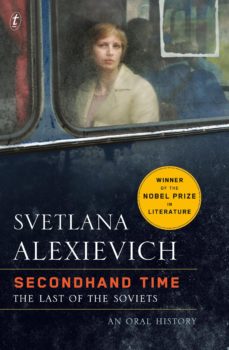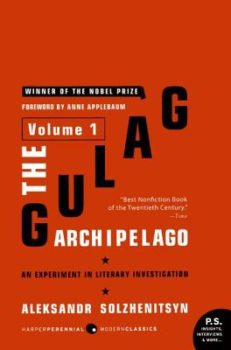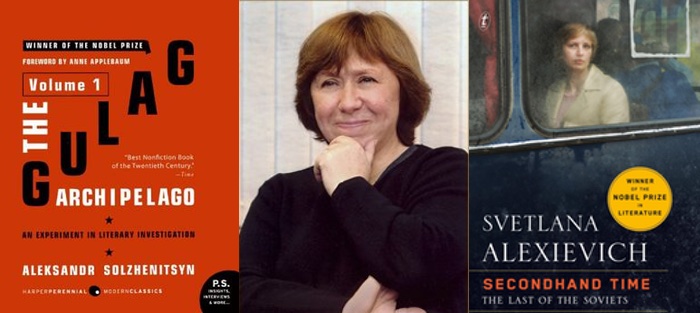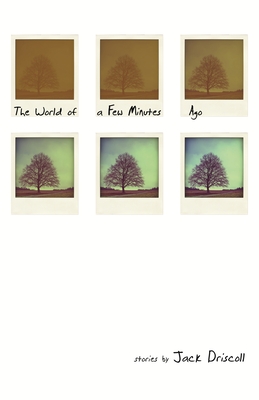Editor’s Note: For the first several months of 2022, we’ll be celebrating some of our favorite work from the last fourteen years in a series of “From the Archives” posts.
In today’s feature, Ian Singleton tackles truth, translation, and history in Svetlana Alexievich’s Secondhand Time. This essay was originally published on July 5, 2017.
Nobel Prize winner Aleksandr Solzhenitsyn’s The Gulag Archipelago is a novel based on the author’s experiences in the gulag and, afterward, internal exile, all of which lasted from 1945 to 1956. The novel is also based on experiences he collected from other prisoners, known as zeks. And although Solzhenitsyn won the Nobel Prize before The Gulag Archipelago’s publication—thus based on his earlier works, all within the genre of “novel”—even this book is considered a literary work. However, the documentary evidence and testimonies of others, which were used to write the book, make it one in a line of Russian literary works of prose (see, for example, Babyi Yar: A Novel Document, by Anatoly Kuznetsov) that don’t translate well into the Anglophone world’s genre distinction between fiction and nonfiction.
Svetlana Alexievich, a more recent Russophone winner of the Nobel Prize for Literature, would seem to continue this tradition. Her recently translated Secondhand Time (Random House, 2016, trans. Bela Shayevich) is also a collection of narratives by Russophones, most of whom began the nineties in the Soviet Union and finished those years only to find themselves in another country, the Russian Federation. The book is subtitled Last of the Soviets. It begins with an introduction by Alexievich herself, then presents several recollections of the days of protest during the August 1991 coup. Many of the chapters are life stories of the witnesses, who recount their experiences from World War II until the fall of the Soviet Union.
However, unlike in Solzhenitsyn’s case, the documentary form and approach of Alexievich’s work has led to criticisms that this Nobel Laureate is “not a writer.” That is, if she’s merely compiling others’ stories, why does she deserve such a prestigious prize, usually given to an author of belles lettres? Sophie Pinkham, in The New Republic, takes this criticism one step further, claiming that due to Alexievich’s creative editing methods, the nonfiction genre is an unfair label for the book:
Poets, playwrights, and novelists are free to pick and choose from the material provided by the real world, and embellish and invent as they please. Their work is judged on its success in conveying a deeper, more abstract kind of truth—what in Russian is called istina, as opposed to pravda, the literal truth, the facts. Literary nonfiction writers, who search for deep truths while remaining faithful to facts, have obligations to both istina and pravda. They shape chaotic reality into compelling narrative, but they aren’t supposed to invent, or to edit so heavily that their subjects become unrecognizable. In exchange for this fidelity, nonfiction writers receive the trust of the reader, who accepts the improbable or poorly written simply because it is true.
Pinkham quotes Alexievich as referring to her work as a “novel in voices.” But Pinkham states, “Without the imprimatur of nonfiction, it is unlikely that Alexievich’s work would have won so much praise around the world.” As a nonfiction writer herself, Pinkham may feel betrayed by those who decided to include Alexievich in the “investigative journalism” or “oral history” sections of the bookstore, whether or not and how much Alexievich herself has embraced these labels for her work. The Russian critic Aleksandr Bikbov confirms that Alexievich creatively edits her interviews, which is problematic from the point of view of social science, but from a “non-professional point of view, brought up in the schools’ high literature program, it’s unnoticeable” (my translation).
This label has been imposed by Western publishers of the English translation of Secondhand Time. Yet Pinkham must use the Russian distinction between istina and pravda to define the Anglophone world’s fiction/nonfiction dichotomy. In English, of course, there’s still only one word—truth—for these Russian two. Is istina perhaps that more abstract version of truth, while pravda is something akin to factuality?
 Pinkham is claiming that these testimonies are not as factual as they would be without Alexievich’s editing. For her, Alexievich’s changes to witnesses’ narratives would be acceptable for a fiction writer but are unacceptable for a historian. But this word “history,” as it would be used by a Russophone, creates yet another dichotomy. In Russian, one word, istoriya, means both history and an individual’s story, or life narrative. A witness in Secondhand Time introduces her own story—which follows a mention of major historical events of the time—with the following distinction: “This is Big History. I have my own little history…” English’s history, a scientific process of determining the truth of past events, and storytelling, the testament of a witness (or somebody close to a witness) of past events, must be represented then by the Russian adjectives “big” (for history history) and “little” (for a life story). In this case, it would seem that pravda is the more important truth of Big History, istina, that of little histories.
Pinkham is claiming that these testimonies are not as factual as they would be without Alexievich’s editing. For her, Alexievich’s changes to witnesses’ narratives would be acceptable for a fiction writer but are unacceptable for a historian. But this word “history,” as it would be used by a Russophone, creates yet another dichotomy. In Russian, one word, istoriya, means both history and an individual’s story, or life narrative. A witness in Secondhand Time introduces her own story—which follows a mention of major historical events of the time—with the following distinction: “This is Big History. I have my own little history…” English’s history, a scientific process of determining the truth of past events, and storytelling, the testament of a witness (or somebody close to a witness) of past events, must be represented then by the Russian adjectives “big” (for history history) and “little” (for a life story). In this case, it would seem that pravda is the more important truth of Big History, istina, that of little histories.
Alexievich embraces the latter alone through “little history,” many personal stories. Yet while the personal stories and revelations conveyed by the witnesses of Secondhand Time are ones which naturally interest writers and readers of fiction, the verisimilitude that good storytelling creates is something untrustworthy to nonfiction writers, who, as a practice, have a mistrust of unsubstantiated anecdote, no matter how much “more abstract” truth might come across.
So, if she’s so interested in istina little history, why hasn’t Alexievich simply rewritten these testimonies into a book labeled fiction—a historical novel, perhaps—to accommodate her move away from cold facts toward warm storytelling, something along the lines of War and Peace? A historical novel has the hard facts so important to Big History, such as Tolstoy’s account of the well-known Battle of Borodino. It also has the emotions of little history, such as the many chapters of Tolstoy’s novel that take place in the parlors of the aristocracy, which Tolstoy himself frequented, about which he didn’t need to do research. There’s triumph and loss, Big History in personal narratives.
Another word for such books is “research novels,” a genre label again pointing to the question of why Alexievich didn’t chose to write a novel in her own voice instead of “a novel in voices.” But taking the “story” part out of this label is tricky. It’s not a news story, a factual narrative about what’s currently happening. The job of the fiction writer is to invoke verisimilitude. Real and factual research helps, of course, but the purpose should be emotional. The more abstract truth comes from the deeper meanings of stories, factual or not. The factuality of this truth is usually taken for granted, and the primary sources need not speak for themselves, even if they want to.
But maybe Alexievich feels that the istina, the “more abstract truth” of Secondhand Time, needs to be told by the actual voices of these individuals, not retold by herself. Is there a “more abstract truth” for all that Soviet/post-Soviet people have suffered? If so, would it be more appropriately labeled with the “imprimatur” genre of research novel, which would confine these testimonies to a traditional arc, to the framework of a bestseller, told by the voice of one author? Is this form of representation (which implies inherent tampering) more acceptable, because it’s disclaimed by the book’s shelf location?
For her critics, Alexievich’s failure to erase the identity of the witness and to adopt the genre of fiction makes her book strangely less truthful. One, the famous Russian writer Zakhar Prilepin, has himself written about the gulag in his novel Dwelling (my translation of Обитель, or Obitel). If Alexievich had done the same, would he no longer call her “not a writer”?
Perhaps Alexievich is trying to defend the istina of her book with her attempt, however faulted, at pravda. This might also have been why Solzhenitsyn used documentary evidence for The Gulag Archipelago. It seems likely he did so not only as a literary technique, to write a historical novel, but also as defense against dismissals of the book on grounds of fabrication. Although his earlier works could be dismissed by the Soviet regime as “novels,” as fiction, it was more difficult to call the testimonies of 250 people false, even though they aren’t quoted directly.
Of course, that regime has ended and so can’t threaten the veracity of Alexievich’s book, which is about the effects of its very downfall. The work of Solzhenitsyn and other similar writers exposed the horrors of the Soviet gulag system. His Nobel was a blow to the Soviet Union in the cultural version of the Cold War. Is Alexievich’s a blow to today’s Russian Federation? Is that why she uses the more documentary approach, to back up her truth?
Pinkham claims, “Secondhand Time rehearses the familiar story of perestroika, glasnost, and the wild hopes and lost illusions of the post-Soviet 1990s.” To whom is this story familiar? Indeed, most of the stories in Secondhand Time paint a horrifying picture of the Soviet world, as Solzhenitsyn did decades ago. But this is where Solzhenitsyn and Alexievich part ways, since Alexievich presents criticism of contemporary Russia as well. (This is unlike Solzhenitsyn, who not only didn’t criticize the current Russian regime but was an ardent supporter of it.)
Here is where Secondhand Time actually becomes quite unfamiliar. For both the Soviet and post-Soviet worlds, Alexievich presents counter-narratives, little histories which complicate and depart from the familiar Big History, which most writers before her have chronicled in one form or another. For example, despite the shift of their entire political economy, many of the voices recorded by Alexievich are not sympathetic to the capitalism brought on by the new regime. One witness tells her:
Today, they accuse us of fighting for capitalism…That’s not true! I was defending socialism, but some other kind, not the Soviet kind—that’s what I was standing up for! Or at least that’s what I thought. It’s what we all thought…Three days later, when the tanks were rolling out of Moscow, they were different, kinder tanks. Victory! And we kissed and kissed…
This person did oppose the Soviet regime by going into the streets to protest, during the coup attempted by Soviet hardliners. But her rejection of capitalism is also clear.
Alexievich herself uses the word “catastrophe” when discussing the lost Soviet world:
The Soviet civilization…I’m rushing to make impressions of its traces, its familiar faces. I don’t ask people about socialism, I want to know about love, jealousy, childhood, old age. Music, dances, hairdos. The myriad sundry details of a vanished way of life. It’s the only way to chase the catastrophe into the contours of the ordinary and try to tell a story.
Another witness, a reader of dissident literature, uses the same word “catastrophe”:
“While we were sitting around, reading Shalamov and Platonov,” my husband said, “civil war has broken out. People used to argue in their kitchens and go to demonstrations, now we’re going to start shooting each other.” That was the mood…It felt like catastrophe was at hand.
Both Alexievich and this witness are focusing not necessarily on Big History politics but on a civilization that has ended and the effect of its end on the little histories of people such as these witnesses.
Yet what is the catastrophe if, according to the Cold War paradigm, capitalism was the winning economic philosophy, which would solve all these formerly communist people’s problems? This hardly sounds “familiar.” And this unfamiliar history comes as a result of the individual voices of the witnesses, not of Alexievich’s retelling, as in the case of The Gulag Archipelago. There is emotion here, a longing, which, whether or not Alexievich shares it, is part of Secondhand Time’s representation of the post-Soviet world. In that world, there is a specific form of nostalgia for Soviet, communist culture, a nostalgia referred to with the German word Ostalgie, a portmanteau of Ost (East) and Nostalgie (nostalgia). As with the sentiments of the witness who confronted tanks in the street, Ostalgie is not necessarily a wish to return to the East German system per se. However, it can be a criticism of the current, capitalist replacement of the former way of life. This nostalgia is present in everyday post-Soviet life, which is Alexievich’s focus. Alexievich is aware that the everyday is just as important to history as major crises and political upheavals. As Bikbov puts it, “It interests [Alexievich], how everyday life turns into war” (my translation).
Ostalgie is a longing for those small, seemingly insignificant, details—some material, some ideological—that once comprised the world which has disappeared. These made up everyday Soviet life, turned on its head when the government of the Soviet Union collapsed. The void the post-Soviet world has failed to fill becomes Ostalgie. And while many of the changes to the formerly Soviet world have been material and economic, what was unfamiliar to me as a reader of these witnesses’ testimonies was how language changed, as well, how people began to “buy” instead of using the Soviet era’s word “procure” (доставать, dostavat). Alone the shift in the language of Gorbachev’s speeches, which transformed from tough talk about foreign powers into discussions of vague concepts of human rights and love for humanity, demonstrates a much more nuanced view than a mere “rehearsal” of how the world of the Soviets changed. This semantic shift on Gorbachev’s part marked the point when Soviet hardliners began to organize the aforementioned coup. But what’s important to Alexievich are not the usual historical details, nor even the factuality of witnesses’ accounts of them. She writes of the “unending quantity of human truths,” a conglomeration that probably leads to a more singular, abstract truth. But this is not one, or even two truths. It’s an “unending quantity,” something which must keep the heads of historians and nonfiction writers—not to mention those of fact checkers—spinning. Because how can something like Ostalgie be factual?
 However, despite the depiction of Ostalgie in her book, Alexievich is not necessarily a sympathetic interlocutor to witnesses with unsettled Ostalgie. When she does insert her own questions into the text, they’re often posed as a challenge to what the witness believes. During one case, in response to a witness’ words about the nobility of death for a great cause, Alexievich asks, “Death and killing—aren’t they one and the same? You lived among murderers.” Alexievich also inserts descriptions of the witnesses’ words, almost like asides, as minute as one word stage cues, but which perhaps give a sense of how the voices might sound, even when those voices are in virulent disagreement. The witness answers, “(Irritably.) For questions like that…They’d grind you into labor camp dust.”
However, despite the depiction of Ostalgie in her book, Alexievich is not necessarily a sympathetic interlocutor to witnesses with unsettled Ostalgie. When she does insert her own questions into the text, they’re often posed as a challenge to what the witness believes. During one case, in response to a witness’ words about the nobility of death for a great cause, Alexievich asks, “Death and killing—aren’t they one and the same? You lived among murderers.” Alexievich also inserts descriptions of the witnesses’ words, almost like asides, as minute as one word stage cues, but which perhaps give a sense of how the voices might sound, even when those voices are in virulent disagreement. The witness answers, “(Irritably.) For questions like that…They’d grind you into labor camp dust.”
Such witnesses probably think of Alexievich as a stooge of the West. But in order to oppose the everyday thinking of a believer of the status quo ideology, such as nationalistic ideas of martyrdom for the Soviet regime, she must, like many artists who hope to challenge an ideology, understand it. This witness later says, “My final wish is that you record the truth. But my truth, not yours.” Alexievich, despite her opposition to the witness’ truth, still permits this attitude to appear in her book, perhaps not in order to be objective, only to connect with readers who might have similar notions.
This witness has the idea that history, written by the victors, is mistaken about the Soviet project, and that those victors have absolute control over the narrative, the truth. In the original, the witness uses the Russian word pravda here. According to Pinkham’s use of this distinction, he wants Alexievich to use his facts, not her own. Yet another witness, a former party functionary, says to Alexievich, “I’m sure you’re just going to get rid of everything I’m saying.” This second witness, proudly on the losing side, is assured that Alexievich will throw away her testimony. She’s probably also referring to pravda, as the previous witness did. What’s clear is that Alexievich, recording one’s pravda or another’s, is more interested in istina, something more abstract. By including other voices, hearing out opposing pravdas, by acknowledging the pain and consequent distrust felt in the post-Soviet world, Alexievich makes major steps toward reaching these people, the ones who feel most left behind.
Because if these witnesses agree there’s more than one truth, might there also be hope for them to understand the opposite pravda? By allowing the reader to hear these voices, their pravda, instead of her own, Alexievich can better give voice to the feelings of disenfranchisement many witnesses feel in the current, capitalist Russia. By doing so, she might ultimately reconcile “my” truth and “yours.” And she might do so, perhaps even better than a more objective history may, by focusing on istina and the importance of storytelling.
Alexievich presents yet another perspective, which defies the “familiar” narrative. One witness, a former higher-up in the last Soviet government of Mikhail Gorbachev, is cocky and cynical. According to Alexievich, he’s a “rare witness,” one who doesn’t seem to have any allegiance to any side except his own. But, as a result of his former job, he’s an insider. His pravda had the authority of the Soviet government behind it. This feeling of authority still shows through in his braggadocio: “You want the facts ‘fried up’? Served spicy, with some extra sauce? Everyone’s thirsty for blood, the people want fresh meat. These days, even death is a commodity.” His “confession” sounds like bragging. He discusses Sergei Akhromeyev, one of the eight members of the coup against the Gorbachev government. Soon after that coup, Akhromeyev committed suicide. This and the voice of Akhromeyev are more official, often heard voices. They stand in contrast to the little histories that make up most of Secondhand Time.
But such sarcastic cynicism is also in little histories of the “last Soviets,” such as this snatch of street conversation:
[I’m] nineteen. I’m not interested in politics. That spectacle is foreign to me. But I like Stalin. Now he’s interesting. Compare today’s politicians to a leader in a military greatcoat. Who comes out looking better? That’s the thing…I don’t need a mighty Russia. I am not about to pull on some stupid boots and hang a machine gun around my neck. I don’t want to die! (He is silent for a moment.) The Russian dream: a suitcase in your hand, and get the fuck out of Russia! Go to America! But I don’t want to move there just to spend my whole life as a waiter. I need to think.
During Secondhand Time’s compilation, a nineteen-year-old would have been born circa the aftermath of the Soviet Union’s fall. This youth was never a Soviet. Were he of the older, Soviet generations, would he still speak in such a flippant way, praise or not, about Joseph Stalin? As another, older witness puts it, “A murderer can’t just be a regular guy. You’re drawn to him. Evil is mesmerizing. There are hundreds of books about Hitler and Stalin.” The Big History of the Cold War has become fodder for jokes.
But there’s a darker side to this phenomenon. A woman who fell in love with a zek points this out to Alexievich, saying, “People bring manuscripts about the camps to publishers and they’re returned to them unread. ‘Again with the Stalin and Beria? It’s not a commercially viable project. The readers have had their fill.’” This is also the familiar story to which Pinkham refers, only it’s not Westerners but Russians who are rehearsing, and dismissing, it.
Maybe witnesses with Ostalgie aren’t important to writers thematizing the post-Soviet world. In Alexievich’s work, they don’t fit into the familiar roles of villains or conformists. Do they represent “my truth” or “yours,” istina or pravda, or none of the above?
But nostalgia is a powerful thing and shouldn’t be ignored. In a review of Secondhand Time, Amelia Glaser and Teresa Kuruc reframe this paradigm, in a sense, by comparing the book’s witnesses with Ostalgie to those Americans who voted for Donald Trump and his dubious slogan “Make America great again,” as if such witnesses were saying, “Make Russia great,” as in Soviet, “again.”
The comparison is important, since it shows how important acknowledgment of such nostalgia is (and what can happen if it’s not acknowledged). On the other hand, Glaser and Kuruc don’t take into account that, in terms of Big History, all of the voices recorded in Secondhand Time are those of losers. One voice says, “My whole life […] I didn’t dare breathe a word of any of this to anyone. Now, I’ll tell you my story.” He proceeds to tell a story of the Great Patriotic War, in which he, a Jew persecuted by the Nazis, served as a Soviet partisan, despite his comrades’ antipathy to Jews. When he returned to his apartment, he found it occupied by fellow Soviets, who called him a “kike” and sent him away. The street noise following this little history has a quote about greatness, “We won, indeed. But our great victory didn’t make our country great.” The Soviet Union’s victory, under Stalin’s leadership, cloaked in a greatcoat, appeals to the nineteen-year-old quoted earlier. This Jewish witness’ story probably wouldn’t. It probably isn’t “commercially viable” either. Suffering from Ostalgie or telling their not commercially viable narratives of the gulag and the crimes of the state, all of these witnesses are losers in One of the Biggest Histories of All—the Cold War, of course. Each of them, from the nineteen-year-old to the veterans of the Great Patriotic War, are more similar to one another than some of them may be to Trump voters.
But anybody who believes in a past greatness, expressed in the Soviet phrase for World War II and the key part of Trump’s campaign slogan, should recognize that this idea suggests a return (that “again” at the end) to a golden age of “greatness” that never existed for everybody—only for a privileged minority. Big History can often either ignore other narratives and leave out other perspectives, especially those of the losers, or speak for them and enforce its own authority over their narratives and over those losers themselves. Did the Soviet Union’s Great Patriotic War and its legacy keep the Soviet Union from losing the Cold War? Did America’s past greatness include African-Americans, Mexican immigrants, women of any ethnic group, or anybody from the poor and working classes?
Ostalgie strays from the “familiar” anti-Soviet narrative. But it abounds in many little histories, the kind in which Alexievich finds something akin to a more abstract istina truth. The last little history is the closest Secondhand Time comes to fiction. The witness has no name. She’s an elderly, cheerful “everywoman” character, whose life changed little over the transition from communism to capitalism. One of those sundry details is her lilacs, symbols of youth or love, which close the book. Symbols are supposed to appear only in fiction. But these lilacs are pravda, and readers should imagine and believe in the truth of lilacs in the post-Soviet world.







